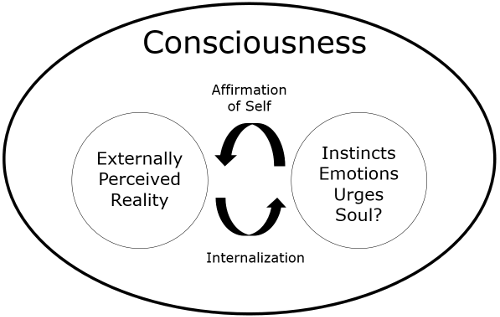I've been thinking about this lately (in part because of some lectures I've been listening to). I think that it's useful to consider this from (at least these) two perspectives.
From Within (the introcosm)
This is the sort of phenomenological way of considering it. Pick a reasonably normal, reasonably linguistically capable individual, who happens to be self-conscious (i.e. awake, not brain damaged, etc.) and ask that person, "From within, what is it like to be conscious?" This will generate a variety of results, I suppose, from person to person, but, I think there will be wide swaths of similarities. In other words, from the first-person point of view, it definitely feels like, or is like, something to be conscious. There is some nebulous group of descriptions "I am aware that I am aware" and "I am aware of myself" and the like, that will probably all be things that such individuals could report or at least agree to.
From Without (the exocosm)
This might be what it's like, from an outsider's point of view, to consider what consciousness is like, in others, when those others are examined. My dogs, for instance, certainly seem (while awake, etc.) more like conscious things than, say, my laptop (or, my laptop running a chess simulator). And, some features of my laptop seem more conscious than, say, my thermostat, and my thermostat seems more conscious than, say, a rug on my floor. What I mean here is that we can say things like "The furnace sounds like it's trying to come on" when it's cold, and, though we can joke and laugh and say things like "Well, of course, the furnace doesn't really try to do anything." But, the rug on my floor, well, it doesn't really seem to do the sorts of things that we think of when we attribute consciousness to something. This, perhaps, slides eventually into stuff like Turing tests.
I think that the Rationalists (or Idealists, depending upon how one uses the term), in philosophy (in particular, the group through which a thread could be drawn, from, say, Plato, through Descartes, Spinoza, perhaps some of Kant, definitely Husserl), start from the introcosm and attempt to say something, eventually, in their metaphysics, about the exocosm. And, of course, they usually fail.
I think that the Empiricists (say, the group from Aristotle through Bacon, Locke, Berkeley, Hume, and later into Carnap and Russell), start from the exocosm and attempt to say something, eventually, in their metaphysics, about the introcosm. And, of course, they too usually fail.
Bridging the gap isn't easy. Maybe it's impossible.
I think that an introcosmic sense of consciousness is different from an exocosmic sense of consciousness. I think that they're both relevant and important. I'm not sure I'm ready to defend a position (and, so, perhaps I'm technically in violation of the rules -- sorry about that Cognisant).
However, I do think that this consideration is useful in informing how we move forward in our thinking about the problem suggested here.

